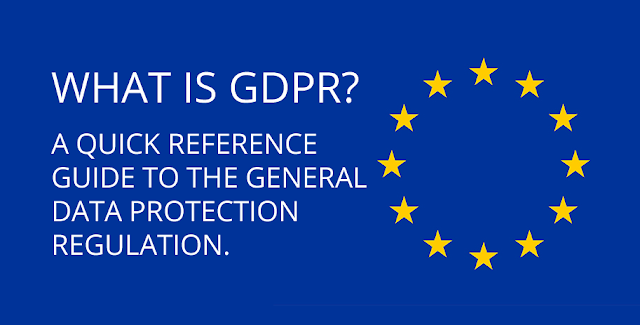WHAT IS GDPR - EVERYTHING YOU NEED TO KNOW ABOUT GDPR
 |
| What's GDPR |
- What is GDPR?
GDPR - "General Data Protection Regulation" is a regulation headed by the three legislative European Union institutions: the European Parliament, European Commission, and Council of the European Union. It brings in some key changes to the current data protection laws in the European Union.
- What's The Aim of GDPR?
GDPR aims to protect the privacy and data of the citizens of EU and also of the European Economic Area, which includes Iceland,Norway and Liechtenstein.
It is majorly focused on respecting the users’ privacy when using electronic communications. Once implemented, the ePrivacy will regulate the processes of placing, accessing, and using identification technologies on user's devices according to the revised definition of personal data as per the GDPR guidelines.
- What changes it introduced?
Before GDPR, the users’ consent was implicit, but now it has to be explicit. Pre-checked boxes or implied consent won’t work with GDPR. Companies can now only process the data of those consumers who have explicitly asked for it.
Companies now need to get explicit consent from the users in order to process their data which is available online.
- What will be its impact?
The biggest impact of GDPR will be that it will substantially reduce the scope of data collection, and consequently, of the amount of data being collected.
Moreover, the data that is collected now has to be used only for specific purposes and not for any new and incompatible purposes.
- How will GDPR Impact You?
GDPR is a set of new regulations to increase the protection of EU citizens’ data. This is very important if your organization does business within the European Union or collects data on EU citizens, regardless of your physical presence in the EU. GDPR will apply to even the non-EU companies who monitor the behaviour of EU Citizens or offer goods or services to them. Even 'clouds' are not exempted from this. The entire ad tech, advertising and marketing ecosystem, including publishers, agencies, DMPs, DSPs, ad exchanges and everyone else in digital advertising will fall under the purview of GDPR.In case of non-compliance, heavy penalties will be levied.
- Which data is considered as “personal data”?
Any data related to a person which can be used to identify them either directly or indirectly is considered as personal data. This data may include anything viz. a photo, a name, an email address, phone number, social media posts, medical information, bank details, a computer IP address or even cookies.













Leave a Comment